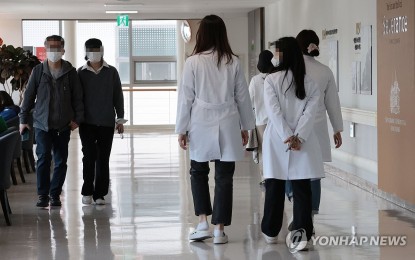
Doctors at a Seoul University Hospital (Yonhap)
SEOUL – A Seoul court on Tuesday dismissed medical professors’ bid to prevent the government from increasing the admission quota of medical schools starting next year.
The Seoul Administration Court rejected an appeal by the Medical Professors Association of Korea to suspend the execution of the government's plan to raise the number of medical students by 2,000 next year.
The appeal was filed against the education minister and the health minister.
The court dismissed the case without deliberation, on grounds that the association would not enjoy direct or specific legal benefits from preventing the increase of the med school quota.
The court also determined that the counterparts to the education minister would be presidents of universities with medical programs, rather than medical professors at those institutions.
The professors' body claimed that the government violated laws on higher education requiring the government to announce plans for university admission 22 months before the following academic year.
The government unveiled its medical school plans only on Feb. 6.
The professors also argued that the public would benefit if the government came up with different policies in essential medical fields.
The court, however, dismissed such benefits as being indirect and abstract, not enough to suspend the government's plan for the quota increase.
This was the first court decision on an appeal submitted by the medical community in protest of the proposed increase of the med school quota, with five other cases pending rulings.
The government has been pushing for the increase of medical students in preparation for the country's fast aging population and a shortage of physicians in rural areas.
On the other hand, doctors have said the quota hikes will undermine the quality of medical education and result in higher medical costs for patients.
They have called for measures to first address the underpaid specialists and improve legal protection against excessive medical malpractice lawsuits. (Yonhap)
